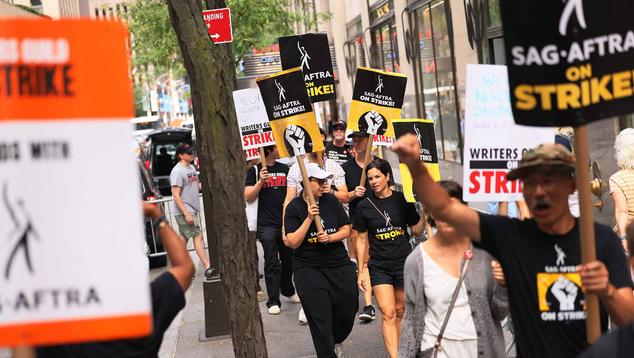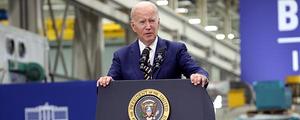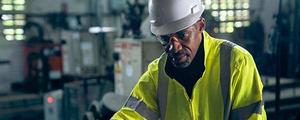Story Highlights
- Two-thirds of Americans approve of labor unions, similar to recent years
- Longer term, support for unions has been rising since 2009
- Record highs want unions to have more influence, say their power will grow
WASHINGTON, D.C. -- Labor unions continue to enjoy high support in the U.S., with 67% of Americans approving of them, similar to the elevated level seen in recent years after more than a decade of rising support. Mirroring this trend, Americans have gradually become more likely than a decade ago to want unions’ influence to strengthen and to believe unions benefit various aspects of business and the economy.
In contrast to the incremental changes seen in U.S. adults’ support of unions over time, the new poll documents an unprecedented uptick since the prior measure, in 2018, in perceptions that unions in the country will become stronger in the future than they are today. A third of Americans (34%) believe this today, compared with 19% five years ago and no more than 25% at any time in the trend since 1999.
Union Approval Steady Near Recent High Point
The 67% of Americans who approve of labor unions today is down slightly from 71% a year ago but marks the fifth straight year this reading has exceeded its long-term average of 62%.
Union approval plunged to an all-time low of 48% in 2009 following the Great Recession, after which it took eight years to recover to its prior level near 60%. While approval has risen since then, it has not returned to its all-time high of 75% in the post-World War II heyday of unions in the 1950s, when workers’ union membership peaked at about 35%, according to a Pew Research Center report. Today, that figure is 8%.
Americans Favor Workers in Labor Disputes
The latest results are from Gallup’s annual Work and Education poll, conducted Aug. 1-23. The survey also probed Americans’ sympathies in the ongoing Hollywood writers and actors strikes, finding overwhelming majorities siding with the workers seeking higher pay and, in the case of writers, protection from losing work to AI.
- By 72% to 19%, Americans sympathize more with the television and film writers than with the television and film production studios.
- Sympathy for television and film actors is nearly as high, at 67%, while 24% side with the studios.
Three in four Americans also side with the United Auto Workers in their negotiations with U.S. auto companies, as workers’ representatives demand significantly higher pay and benefits as well as a shorter workweek for their members. The union and auto companies have until Sept. 14 to reach an agreement before the current contract expires, opening the way for strikes at three Detroit automakers.
Desire for More Union Power Grows as Does Belief in Union Benefits
The August survey also updated several indicators of public support for unions last asked in 2018 or earlier. Each measure shows relatively high public support for organized labor following years of gradual improvement after bottoming out in 2009.
The first is Americans’ beliefs about the effect unions have on different groups.
- Seventy-seven percent now say that unions mostly help rather than hurt union members. Today’s reading is up seven percentage points from 2016 and 11 points from 2009 and essentially ties the prior high of 76% in 2003.
- Meanwhile, a record-high 47% now believe unions help rather than hurt nonunion workers, well above the 38% saying this in 2016, which is tied for the prior high along with a 2005 measure.
- A record-high 61% also say unions help rather than hurt the U.S. economy, eclipsing the prior high from 1999 by six points.
- Fifty-seven percent, roughly matching the prior high, also say unions mostly help the companies where workers are unionized.
Similarly, Americans’ desire for unions to have more influence in the country has increased gradually, from a record-low 25% in 2009 to 43% today. This marks a new high in desire for union empowerment, exceeding the prior high of 39% in 2017 and 2018.
Record Numbers Foresee Unions Gaining Clout
Meanwhile, Americans’ expectation for the future of unions’ power has followed a different trajectory, with belief that their power will increase surging over the past five years after holding steady near 20% for the prior two decades.
As a result, nearly as many U.S. adults today say unions will become stronger (34%) as foresee them weakening (36%). Just over a quarter believe union power will stay the same, consistent with the level seen since 2009.
Support for Unions Up Among Partisans
On all measures of public attitudes toward unions, support is highest among Democrats and lowest among Republicans, with independents’ views somewhere in the middle. However, the trends for all three groups have increased since 2009, largely paralleling the national figures.
This is seen in overall approval of unions, where approval among Democrats, Republicans and independents all declined in 2009 and then gradually recovered. Currently, 88% of Democrats, 69% of independents and 47% of Republicans approve.
In addition, Democrats’ desire for unions to have more influence has reached a record high of 61% -- one point above the trend high previously measured in 2005 and 2018 -- after falling to 39% in 2009. Independents’ desire to see unions’ influence grow is at an all-time high of 45%. Republicans are much more likely to want unions to have less rather than more influence, but the 21% today who want them to have more influence roughly ties with last year’s 22% record high.
The trends in partisans’ predictions of how much power unions will have in the future have not aligned. Republicans are barely more likely today than in the prior two measures (in 2017 and 2018) to say unions will become stronger, while Democrats and independents have become much more likely to foresee this.
Bottom Line
Labor unions are enjoying a moment of high public approval and strong belief in the benefits they offer to workers, businesses and the economy. This partly reflects the lengthy recovery from unions’ extraordinarily poor image in 2009, just after the recession and less than a year after the auto industry received federal bailouts. But attitudes have more than rebounded since then. After fully recovering from the recession by 2017, approval continued to rise throughout the pandemic, possibly due to the increased focus on worker needs during that period, as well as Republicans’ growing distaste for corporate America.
U.S. adults are more likely now than at any time in the past quarter-century to believe labor unions will become stronger -- possibly, at least in part, because the Hollywood strikes have brought TV and movie production to a standstill this summer. The broader increase in worker strikes occurring in the U.S. in recent years may also be contributing to unions’ perceived power.
Today’s striking workers may have a stronger hand in their negotiations than they would have had in the past given today’s elevated public support for unions -- the public relations risks appear higher for employers today. One caveat for unions is that fewer than half of Americans still want union influence to grow. Also, Republicans continue to be more anti- than pro-union in many respects, meaning that significant resistance to expanding union power remains baked into the nation’s two-party political system.
To stay up to date with the latest Gallup News insights and updates, follow us on Twitter.
Learn more about how the Gallup Poll Social Series works.




